|
Rabbit and Small Mammal Behaviour and Potential Problems |
|
Rabbits are becoming increasingly popular as pets, living either
outdoors in a hutch or as a house-rabbit. With the growing trend to
keep rabbits in the home, behaviour problems that were not very noticeable in outdoor rabbits have become more
apparent.
These include:
-
house soiling and urine spraying
-
destructive behaviour (chewing or scratching objects in the home)
-
biting or "boxing" at people
-
chasing or attacking other pets
-
hiding and fleeing
-
withdrawn behaviour
-
weight loss
-
pulling out their own fur
Rabbits are very intelligent and learn throughout their lives, so
can quite easily be trained. They tend to be quite
cautious and reserved in their behaviour, but once
you have gained their trust they make affectionate and rewarding pets.
|
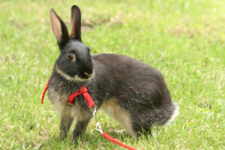
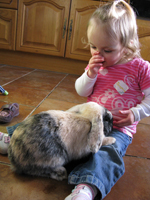 |
|
|
|
|
|
|
|
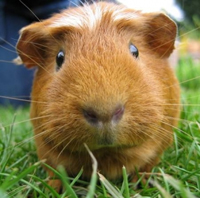 |
Behaviour problems in
other small mammals include:
|
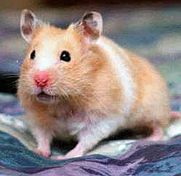 |
|
|
|
|
|
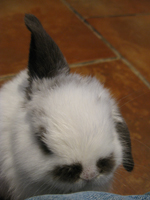 |
Causes of Behaviour Problems in
small mammals
Rabbits and other small mammals such
as mice, rats, gerbils and hamsters evolved as prey animals. They therefore have a natural
predisposition to respond fearfully to any potential threat, usually by
attempting to flee and hide, and if captured they may attempt to
escape by biting and (in rabbits) by raking with their powerful back legs.
All animals quickly learn to recognise the
signs of an impending "threat", and may respond by running away for
no apparent reason or with a "pre-emptive strike", giving rise to
apparently unprovoked attacks. Rabbits are well-armed for defending
themselves, so any attack directed at people or other pets can pose
a significant problem and should be taken seriously.
Because these animals became popular
as domestic pets relatively recently, they have had less time to adjust and adapt to life with humans. Some
behaviour problems are features of natural
behaviour, which are inappropriate for the domestic situation in
which the pet lives.
With all animals, experience has a major impact on future behaviour.
It is therefore essential to always ensure that your pet is handled
gently and carefully. Remember that the instinct of any prey animal
is to avoid
capture - for these types of animals and birds, allowing them plenty of time to become accustomed to being handled will help to prevent fear-related problems. |
| |
|
|
Treating behaviour
problems
in rabbits and other small mammals
In all cases, a treatment plan is
devised using only gentle, positive methods tailored to the species
/ individual pet involved. By using reward-based methods to teach the
pet more
appropriate alternative behaviour, many undesired behaviours can be
reduced or resolved. In cases where aggression or fleeing is brought
about through fear of a person, animal or object, a behavioural
modification technique called "de-sensitisation and
counter-conditioning" can reduce the
fear and allow the pet to learn a more appropriate response. |
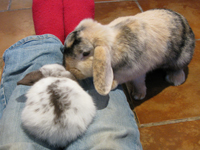 |
|
|
|
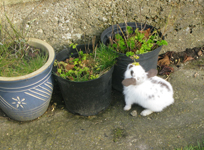
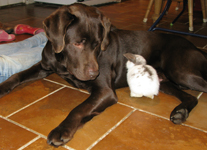 |
Prevention of Behaviour Problems in
Rabbits
As with all animals, good early socialisation contributes vastly to
the prevention of behaviour problems later in life, as it teaches
the rabbit how to interact appropriately with the people and animals
with whom it lives, and gently introduces it to the sights, sounds
and smells it will encounter later in life, helping to prevent fear
of these stimuli later on.
The
socialisation period for rabbits is uncertain, although studies
suggest that it may begin at around
four weeks of age. When choosing a pet rabbit, owners should look
for one which has been gently handled regularly and frequently,
ideally by many different people, from the age of about four weeks.
Remember that the rabbit is a prey animal and therefore its first
assumption is always that the new person / animal / object is going
to try to eat it! Fear-related problems will develop very quickly as
a result of a single bad experience, so anyone who handles a rabbit
must do so very gently and carefully, and should allow the rabbit to
approach in its own time.
While the socialisation period is the
optimum time for introducing a rabbit to the world, learning
continues throughout life, so even a poorly socialised rabbit can be
rehabilitated with behaviour counselling. |
|
It's never too late to help your pet,
and I'm always happy to hear from you, so if your rabbit or small
mammal pet is exhibiting any behaviour that is giving you cause
for concern, please see your vet to rule out medical causes and to
request a behavioural
referral, then
contact me to make an appointment. |
|
